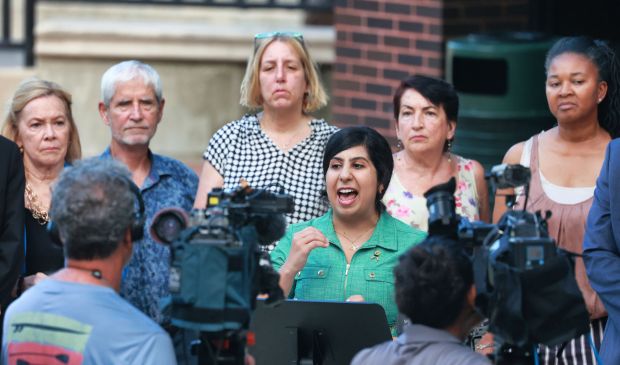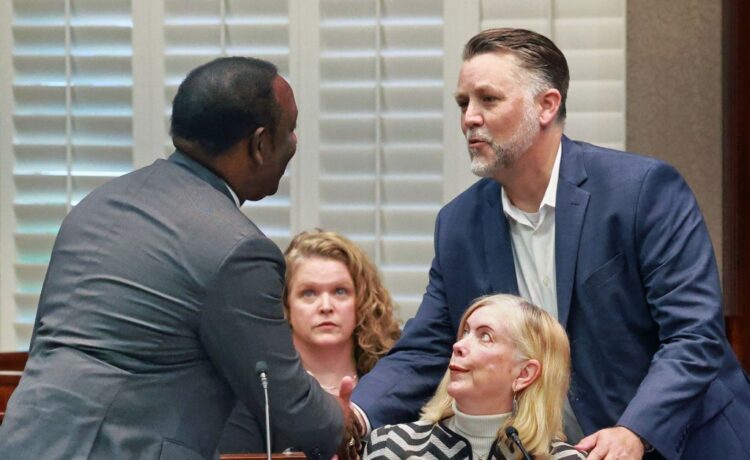Orange County appears to have lost a legislative fight to pay for affordable housing projects with its lucrative stream of tourist-tax money — a largesse that an opposing Central Florida lawmaker called “a convenient pot of gold.”
But future battles to loosen spending restrictions on the money are likely ahead.
Some advocates envision better outcomes on a tax plan that could have raised $56 million a year for affordable housing locally.
“Other counties are realizing flexibility would allow them to better serve their communities in ways we haven’t been able to do before,” said Rep. Anna Eskamani, who offered a tax-bill amendment to let counties levy a 1% “tourist impact” surcharge on hotel-room rentals if voters approved. “Though it wasn’t successful in this first attempt, over time, I’m hoping, we can win over some people on this issue and have the Legislature provide that option for Orange County voters.”
An Orlando Democrat, Eskamani introduced the proposed rule change, which was recommended last summer by Orange County Mayor Jerry Demings’ citizen-led, tourist-tax advisory board over objections of hoteliers.
It was among the county’s top legislative priorities in this session, which began Jan. 9 and ends March 8.
But the amendment was scuttled Feb. 14 by a voice vote in the GOP-dominated House Ways and Means Committee.
Still, the measure provided impetus for committee chair Stan McClain, R-Ocala, to hold an “educational” session Tuesday about the history and purposes for locally levied tourist development taxes, known as TDT.
“We had several bills filed this session and last session that dealt with specific parts of TDT and how people want to change it,” McClain said. “Not saying they don’t have merit…But I don’t think that’s the best way for us to set public policy.”
Orange County TDT task force members offer other spending ideas
He said the tax proceeds were intended to fund convention centers, promote tourism and build stadiums.
Among a handful of pending bills proposing other uses for TDT is a measure filed by State Sen. Linda Stewart, D-Orlando, to let counties divert some proceeds to fund incentives for film and television productions in their jurisdictions.
Tourist taxes are levied in all but five of Florida’s 67 counties. Osceola County levied the very first in 1977.
Orange County’s record-high $359 million in collections led the way last year.
Total TDT revenues in the state have nearly tripled over the past decade — from $660 million 10 years ago to a projected $1.8 billion this fiscal year, according to an overview by Kimberly Berg, the committee’s deputy staff director.
She pointed out that none of the TDT levies in Florida has an expiration date, which HB 7073, the Ways and Means tax bill, proposes to change. It would require tourist-tax levies to be renewed by voters every six years unless the proceeds are already committed to paying off a construction debt.
A Florida Senate version of the bill doesn’t require the levies to be regularly renewed.
Demings, who personally lobbied the county’s legislative delegation and the Florida Association of Counties for support, said he was concerned about the perception that the county is flush with money from TDT.
He worried that the state might look to take some.
While acknowledging funding challenges for creating affordable housing, improving infrastructure and addressing transportation needs, Rep. David Smith, R-Winter Springs, urged caution about expanding TDT uses.
“I think in the Legislature sometimes we’re standing in the breach between people who want to reach out and grab that convenient pot of gold because they have a general revenue shortfall in their county,” the lawmaker said. “They can then talk themselves into why TDT should be spent on something it was not originally intended for.”

During his first term as Orange County mayor, Demings created a “Housing For All” task force and a pledge to put at least $10 million a year into a local trust fund to spur affordable housing projects in the tourism hub.
County leaders have steered $67.7 million in public money into the fund in five years, budget director Kurt Petersen said. About $3 million has been spent and about $39 million is committed to projects in planning stages.
Jane Healy, a former managing editor of the Orlando Sentinel and co-chair of the TDT tax force, said she was disappointed but not surprised the impact-tax did not garner more support this session, its first time in front of lawmakers.
“The industry was against it,” she said.
Eskamani said housing challenges differ here from other communities because of tourism’s dominance.
Central Florida’s “service economy creates an environment where a lot of our best and brightest workers who deliver the most magical experiences struggle to have a roof over their heads and food on their tables,” she said.
Eric Gray, executive director of the Christian Service Center which serves people in need, appealed to Ways and Means Committee members to address tourism’s “strain on our community’s infrastructure.”
He said Orlando draws 75 million visitors a year, twice as many as visit Paris.
“That’s a big deal and we should all be benefitting. We should all be basking in the gloriousness of that,” said Gray, also a member of the county’s TDT task force. “I think we have the opportunity to do that if we just look at reimagining how we manage the tourist development tax.”
Tourism lobby tries to steamroll Orange County hotel tax group | Commentary















